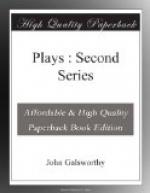Letting his eyes travel
from the judge and the jury to frome, he
sits down.
The judge. [Bending a little towards the jury, and speaking in a business-like voice] Gentlemen, you have heard the evidence, and the comments on it. My only business is to make clear to you the issues you have to try. The facts are admitted, so far as the alteration of this cheque and counterfoil by the prisoner. The defence set up is that he was not in a responsible condition when he committed the crime. Well, you have heard the prisoner’s story, and the evidence of the other witnesses—so far as it bears on the point of insanity. If you think that what you have heard establishes the fact that the prisoner was insane at the time of the forgery, you will find him guilty, but insane. If, on the other hand, you conclude from what you have seen and heard that the prisoner was sane—and nothing short of insanity will count—you will find him guilty. In reviewing the testimony as to his mental condition you must bear in mind very carefully the evidence as to his demeanour and conduct both before and after the act of forgery—the evidence of the prisoner himself, of the woman, of the witness—er—Cokeson, and—er—of the cashier. And in regard to that I especially direct your attention to the prisoner’s admission that the idea of adding the ‘ty’ and the nought did come into his mind at the moment when the cheque was handed to him; and also to the alteration of the counterfoil, and to his subsequent conduct generally. The bearing of all this on the question of premeditation [and premeditation will imply sanity] is very obvious. You must not allow any considerations of age or temptation to weigh with you in the finding of your verdict. Before you can come to a verdict of guilty but insane you must be well and thoroughly convinced that the condition of his mind was such as would have qualified him at the moment for a lunatic asylum. [He pauses, then, seeing that the jury are doubtful whether to retire or no, adds:] You may retire, gentlemen, if you wish to do so.




